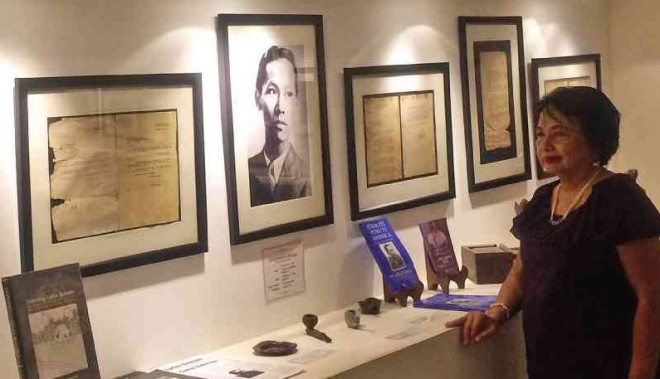Carlos Bulosan legacy lives on

TERESITA DACPANO, head of the information and publication office of the University of Eastern Pangasinan, with the memorabilia on Carlos Bulosan displayed at the UEP Museum in Binalonan, Pangasinan. photo by Gabriel Cardinoza
Fifty-eight years after his death in 1956, writer Carlos Bulosan continues to inspire his town mates in Binalonan town in Pangasinan province.
“Of course, we are very proud of him. He is our hero and he is an inspiration to the people,” said Teresita Dacpano, head of information and publication office of the University of Eastern Pangasinan (UEP), a local government-run institution here.
On Sept. 11, Binalonan commemorated the writer’s death anniversary as Carlos Bulosan Day.
Dacpano said like in the previous commemorations, literary contests on Bulosan among the town’s high school and elementary students were held.
“We are doing this to show to the people that he is really a hero worth remembering,” she said.
Article continues after this advertisementBulosan, who was born in a farming village known then as Mangusmana (now Mangcasuy), was among the young Filipino migrant workers who arrived in the United States in 1930.
Article continues after this advertisement
Bestseller
While there, he did menial jobs, working in restaurants, plantations and canneries. In 1943, he wrote “My Father Goes to Court,” his first short story published in the New Yorker Magazine.
The following year, American book publisher Harcourt, Brace and Co. compiled Bulosan’s stories in a single volume titled, “The Laughter of My Father,” which became a bestseller.
In 1946, his autobiography, “America is in the Heart,” which was about his life as a migrant worker in the US, was published.
‘Great influence’
Local fiction writer Manuel Diaz said Bulosan had been a “great influence” on him as a writer. “I was only in high school in the early 1950s when I read ‘My Father Goes to Court’ and I was amazed by the simplicity of his style,” Diaz, 75, said.
From that time on, he said, he would read every article that Bulosan wrote, including poems, short stories and essays, that he found in the library of what was then the Binalonan High School.
“He was my idol as a writer because of the local color [in his stories]. He had a great influence on me because I’m also a writer in Ilocano and English and I also used local color in my stories,” he said.
Diaz had published three books—“Rice for the Moon and Other stories (1984),” “Ilocano Harvest (1988),” and “Paraiso a Papel (Paper Paradise) (2005)”—and had written about 150 Ilocano stories.
In 2007, he translated Bulosan’s “America is in the Heart” into Ilocano language through a grant from the National Commission for Culture and the Arts.
The Ilocano translation, “Adda iti Puso ti America,” was also serialized in the Ilocano weekly magazine Bannawag for 47 weeks. Two years later, the translation was published in book form.
Original letters
To keep Bulosan’s memory among Binalonan residents, a part of a museum at UEP displayed original copies of letters that Bulosan sent to his brother and to then First Lady Aurora Quezon, Dacpano said.
“We hope to exhibit his original manuscripts and other memorabilia here,” she said.
After Bulosan’s death in Seattle, Washington, the literary pieces he wrote since 1914, which consisted of short stories, poems, plays and essays, have been kept in seven boxes, a folder and 17 microfilm reels at the University of Washington Libraries in Seattle.
Dacpano said a three-unit subject, “Life and Works of Carlos Bulosan,” has been offered as a required course at UEP starting this school year after the Commission on Higher Education approved it.
“We have also met with division office officials to work out the inclusion of Bulosan’s stories among the readings in elementary and high schools here,” she said.